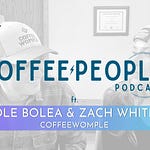Guest: Jenny Barber
Company: Talitha Coffee Roasters, San Diego, CA
Role: Co-Founder/Brand & Impact Manager
Online: talitha.com • @talithacoffeeroasters
What they drink: Iced Oat Milk Latte or Cold Brew
For some, coffee is a mere vessel for caffeine. For others, it is a passion for flavor and an explanation of the senses. For many, the community and the human connections found over a cup of coffee, be it at home or at the cafe, mean as much—or even more—than the coffee.
Talitha Coffee, founded by partners Robert and Jenny Barber, has tapped into a community that appreciates all three. They’ve expanded on their personal connection to coffee to create a business that also provides the opportunity to expand their efforts to support the survivors of sex trafficking.
Talitha Coffee started as a single coffee shop. For Jenny and Robert, the ceiling of support that the shop enabled was way too low. They tapped into their network to find a partner who would help them expand their roasting and cafe efforts through acquisition.
By purchasing coffee businesses ready to sell, the Talitha business has dramatically expanded the number of opportunities they can provide survivors of sex trafficking, as well as exponentially increased their ability to share their message of support.
KEY TAKEAWAYS FROM THE PODCAST
The name comes from the phrase Talitha Koum, which translates to "little girl, arise" in the ancient Semitic language Aramaic.
Talitah is based in San Diego but going nationwide by pursuing further acquisitions.
Jenny's relationship with coffee began in 2015 when her husband Robert Barber started roasting on a stovetop popper at home. His hobby became a business opportunity to service their efforts in anti-human trafficking. Their non-profit efforts have been part of their life for much longer–15 years and running. It's a cause close to home, as Jenny was once a victim.
Through their non-profit work, they saw a need to assist trafficked victims in the job industry. It was—it is—stressful work, and Jenny was feeling defeated. Talitha has given her and her husband the opportunity to tackle the problem from a different angle. They jumped right in, opening a coffee shop in the San Fernando Valley in 2020. It's always a challenge, but something was going on in 2020 that made it more so…what was that again…I forget. Just kidding, it was Covid-19.
There was a ceiling for the number of survivors they could help in a small coffee shop. They wanted to go further and believed that business and positive impact aren't mutually exclusive. They reached out to their current partner, Mike Glanz, for guidance and support to make it so. The answer was to grow through acquisitions. Two years after opening the cafe, they made their first purchase, with their roasting pound going from 300 to 10,000 pounds overnight. They didn't stop there. The growth has continued with more education, more training, more support, and advocacy occurring as they've pushed the boundaries of the business.
During an acquisition, Talitha imparts its mission-based ethos on a business that may not have started in pursuit of a particular cause. The response–according to Jenny–has been positive, as they've imparted purpose beyond the job to their new partners, who have turned into passionate advocates themselves.
Brand = Hope roasted. Hope gives us the inspiration to take another step. It allows us to believe that the next step into a different place is still possible.
Talitha Survivor Care Network is a network of resources for survivors that features therapy options, legal services, life services, job placements, and beyond.
A wild stats per Jenny: 80% of victims who become survivors end up being re-victimized.
Of survivors who do make it out, only a small number of them end up thriving. In part, because due to the young age of the average victim, they've missed out on key developmental, education, and emotional steps. Those developmental delays aren't often given the same sort of flexibility to overcome out in the world that a child making mistakes might be offered. Sometimes, the unknown is more terrifying than the reality that we're living in. It's a contradiction that many victims face.
Finally, here is a piece of advice from Jenny Barber. To paraphrase, people get stuck in comparing themselves. Frustration is an opportunity. What if we are the answer to the problem that we see? Achieving something starts from taking steps in everyday life. Ask yourself, "What are you doing today to get closer to that goal."
WHAT IS SEX TRAFFICKING?
From the CDC.gov website: Click to learn more.
Sex trafficking is a type of human trafficking and is a form of modern-day slavery. It is a serious public health problem that negatively affects the well-being of individuals, families, and communities. Human trafficking occurs when a trafficker exploits an individual with force, fraud, or coercion to perform commercial sex acts or work.
Sex trafficking is defined by the Trafficking Victims Protection Act of 2000 as "the recruitment, harboring, transportation, provision, obtaining, patronizing, or soliciting of a person for the purpose of a commercial sex act." It involves the use of force, fraud, or coercion to make an adult engage in commercial sex acts. However, any commercial sexual activity with a minor, even without force, fraud, or coercion, is considered trafficking.
It was quite challenging to find clear and understandable resources to confirm the prevalence of trafficking victims. We reached out to Jenny to ask for some trustworthy resources for more information about sex-trafficking in the United States, and beyond.
UPDATE: STATS FROM JENNY BARBER
"Trafficking is challenging. Because it is organized crime and because there are many aspects, like government corruption, the research is incredibly challenging and limited in some ways. You may see some conflicting stats. Such as 27 million, 49 million, and 50 million slaves in the world today. The truth is, we don't actually know. Despite our best efforts to track these numbers, the reality is that some of the most vulnerable groups (runaways, immigrants, villages, foster youth) can be hard to track or firmly count. I would say these numbers are all conservative estimates, but I feel est. 50 million is the most realistic.”
The organizations cited below have some broader statistics that I do not necessarily agree with. But I do find the following stats relevant and feel like they do a decent job of capturing the current data. As someone who has done this work for so long, I have to sift through the information and hold what feels relevant, realistic, and the best reflection of what I see as boots on the ground.”
Statistics provided by Jenny Barber via referenced organizations.
70% of trafficked individuals come from impoverished backgrounds, highlighting the link between economic vulnerability and trafficking (International Labor Organization (ILO), 2022). Updated for 2024.
Women and girls make up 72% of trafficking victims, many of whom are trafficked for sexual exploitation and forced labor. Economic empowerment can specifically target this vulnerable group by providing financial independence (United Nations Office on Drugs and Crime (UNODOC), 2020).
A study found that 65% of trafficking survivors were unemployed after exiting their trafficking situations, indicating a critical need for economic empowerment initiatives (Freedom Fund, 2019).
Only 16% of survivors had completed secondary education, underscoring the necessity of educational and vocational training as components of economic empowerment (Polaris Project, 2018).
Survivors without stable economic opportunities are up to 75% more likely to be re-trafficked, emphasizing the need for sustainable economic empowerment programs (Global Freedom Network, 2021).
80% of survivors report experiencing severe anxiety and depression, conditions exacerbated by financial instability. Economic empowerment can alleviate some of these mental health challenges by reducing financial stress (National Survivor Network, 2017).
Less than 10% of survivors have access to traditional financial services, such as bank accounts or credit. Economic empowerment initiatives often include financial literacy and access to microfinance, which are crucial for long-term stability (Freedom Network USA, 2020).
Trafficking survivors, on average, earn 50% less than their non-trafficked counterparts in similar job roles, highlighting the need for targeted economic empowerment to bridge this income gap (ILO, 2021).
Only 20% of survivors manage to secure long-term employment without targeted support, indicating the effectiveness of structured economic empowerment programs (International Organization for Migration (IOM), 2019).
Entrepreneurship programs have shown that 60% of participating survivors can successfully start and maintain small businesses, illustrating the potential of such initiatives in fostering economic independence (Ashoka, 2022).
Trusted Websites/Organizations shared by Jenny Barber
A21 - A21’s mission is to end human slavery.
IJM - International Justice Mission works to strengthen governmental oversights and justice systems and rescue victims.
FBA - Freedom Business Alliance addresses economics of trafficking.
Treasures - Empowering women in the sex industry and trafficked victims to live healthy flourishing lives.
J180 - Justice 180 advocates and provides support for victims.
Guardian Group - To prevent and disrupt sex trafficking of women and children.
IN CASE YOU MISSED IT
Coffee People: Lee Lizotte, True Love Coffee Co.
Guest, Lee Lizotte shares his warm, sweet, kind theory about coffee and life.
ROAST! INDUSTRY PARTNERS
A huge, on-going thank you to all of this show’s industry partners.
Roastar • Zumbar Coffee & Tea • Steady State Roasting • Coffee Cycle • Camp Coffee Company • Ignite Coffee Company • Ascend Coffee Roasters • Marea Coffee • Cape Horn Green Coffee • Hacea Coffee Source • Crossings Coffee • Sivitz Roasting Machines • Craft 42 Roasters • Me and My Uncle Coffee Roasters • Cozy Canine Coffee • Relative Coffee Co.

BRANDS WE USE & HAVE PARTNERED WITH*
Please use these links. You’ll be getting a great gear AND supporting Roast! West Coast. The links below enable us to generate some affiliate revenue. As always, we don’t partner with brands we don’t use, coffee we don’t drink, or strongly recommend.
















Share this post